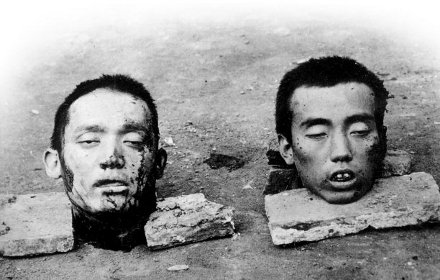On the tenth day of the tenth month — Double Ten Day, as it has since been remembered in China and the Chinese diaspora — the quick execution of a few revolutionaries signaled the surprising end of China’s 2,000-year-old imperial government.
Actually, the collapse of imperial rule wasn’t such a surprise: China’s last dynasty had foundered in the face of the 19th century challenges of European colonialism; driven by multitudinous grievances, popular revolts and reform movements had buffeted China in recent years, most seriously the turn-of-the-century Boxer Rebellion.
The Qing Dynasty was a tinderbox. But one never knows what spark will set the flame.
On October 9, 1911, revolutionaries in the central China town of Wuchang — today merged with neighboring towns into the city of Wuhan — lit the fuse literally when a bomb they were building for a planned insurrection accidentally went off.
In the ensuing scramble, police raided the joint and found incriminating lists of thousands of revolutionary recruits. Arrests followed fast, and several (three*) of the arrested were summarily put to death on the morning of the tenth.
But the plot’s apparent misfortune actually turned out to be its spur to victory.
Realizing that their identities were exposed to the authorities, and that they were in danger of immediate execution, the revolutionaries … revolted.
Their military forces mounted a successful municipal coup d’etat.
While the central government dilated, insurrectionary Wuchang appealed to the provinces for solidarity, and within weeks the Wuchang Uprising had blossomed into full-fledged revolution: the Xinhai Revolution, to be exact. By the following February, China’s last child-emperor had been forced to abdicate.
For the first time in millennia, the fallen dynasty was not succeeded by another dynasty. Though the new state was itself heir to the myriad contradictions and weaknesses that dogged the Qing, it was a definitive turning point: China became Asia’s first democratic republic, the polity that today is Taiwan.
* The names Peng Chufan, Liu Yaocheng and Yang Hongsheng are proposed in this history.
Update: This excellent History Today article for the Double Ten centennial also specifies three executions, and even includes this outstanding public domain image from the Francis Stafford collection.
On this day..
- 1614: Magdalena Weixler, "my innocence will come to light" - 2020
- 1983: Waldemar Krakos, Dekalog inspiration - 2019
- 1796: Claude Javogues - 2018
- 1989: Jimmy Chua and his Pudu Prison siege accomplices - 2017
- 1783: Jacques Francois Paschal, rapist monk - 2016
- 1867: Not Santa Anna - 2015
- 1932: Lee Bong-chang, would-be Hirohito assassin - 2014
- Corpses Strewn: The Streltsy - 2013
- 1698: The Streltsy executions begin - 2013
- 1987: Eshan Nayeck, the last executed in Mauritius - 2012
- 1707: Johann Patkul, schemer - 2011
- 1800: Prosser's Gabriel, slave rebel - 2010
- 1923: Susan Newell, the last woman hanged in Scotland - 2009


Thanks for sharing your thoughts about pelen raport. Regards
When I originally commented I seem to have clicked on the -Notify me when new comments are added- checkbox and now every time a comment is added I
recieve 4 emails with the same comment. There has to
be a means you can remove me from that service?
Thanks!
Breed, train, bet and capture that trophy of success in every tournament, win points and utilize them too.
You can choose a career in many sectors, including
education, automotive, fashion and fitness to name just a few.
Selling and buying values are different in each region.
my page Country Friends Hack
It’s an amazing article for all the web viewers;
they will obtain benefit from it I am sure.
my webpage The Walking Dead Road to Survival Cheats
I do trust all the concepts you’ve offered on your post.
They are very convincing and will certainly work. Still, the posts are very brief for starters.
May you please prolong them a little from next time? Thanks for the
post.
My blog – Mino monsters 2 evolution hack
What’s up, I wish for to subscribe for this web site to obtain hottest updates, so where
can i do it please assist.
What a data of un-ambiguity and preserveness of precious experience about unpredicted emotions.
Pingback: ExecutedToday.com » 1926: Shao Piaoping, journalist
Pingback: 1946: Chu Minyi, collaborationist Foreign Minister |
Pingback: ExecutedToday.com » 1989: A day in the death penalty around post-Tiananmen China
Pingback: ExecutedToday.com » 1644: Looters in conquered Beijing
Pingback: ExecutedToday.com » 1911: Ah Q
Pingback: ExecutedToday.com » 1898: The Six Gentlemen of the Hundred Days’ Reform
Pingback: ExecutedToday.com » 1839: An opium merchant
Pingback: ExecutedToday.com » 1900: En Hai, the murderer of von Ketteler
Pingback: ExecutedToday.com » 1905: Fou Tchou-Li, by a thousand cuts